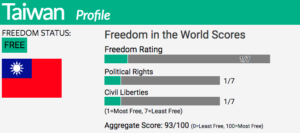Before leaving #Taiwan, Mrs. #Pelosi was expected to meet human-rights activists incl Tiananmen protest leader Wu’er Kaixi, fmr Hong Kong bookseller Lam Wing-kee & Lee Ming-che, a Taiwanese activist who spent 5 years in a Chinese prison, @WSJ reports. https://t.co/pzs1ieVp6n
— Democracy Digest (@demdigest) August 3, 2022
House Speaker Nancy Pelosi departed Taiwan on Wednesday after a whirlwind visit that included a meeting with Taiwan’s president and vows to preserve democracy in Taiwan in the face of growing threats from mainland China, The Wall Street Journal reports:
Mrs. Pelosi (D., Calif.), the highest-ranking U.S. official to visit Taiwan in a quarter-century, now heads to South Korea and Japan before returning to the U.S. During her meeting with Taiwan President Tsai Ing-wen on Wednesday, Mrs. Pelosi said the U.S. wouldn’t abandon its commitment to Taiwan, framing her visit as part of a broader struggle over democracy’s future.
“Today the world faces a choice between democracy and autocracy,” Mrs. Pelosi said. “America’s determination to preserve democracy here in Taiwan and around the world remains ironclad.”

Wikipedia
Wei Jingsheng (right), who was persecuted for calling for democracy in China and has dealt repeatedly with Pelosi since being expelled by Beijing, said her “key asset” was that she listened to dissidents, The FT reports. “Over time, she has proven that she is more often right on the PRC [People’s Republic of China] than others,” said Wei [a recipient of the National Endowment for Democracy’s 1998 award], who echoed a view shared by friends and opponents that might explain Pelosi’s determination to visit Taiwan despite the warnings: “Once she makes a decision, few can dissuade her.”
Pelosi met with prominent human rights advocates who were once imprisoned in China, using a visit to the National Human Rights Museum in Taipei to highlight the stark contrast between Taiwan’s democratic reforms and the Chinese Communist Party’s intolerance for dissent, The Washington Post’s Christian Shepherd and Vic Chiang add:

 This statement from Pelosi was about upholding the status quo and also traditional American values,
This statement from Pelosi was about upholding the status quo and also traditional American values, 





